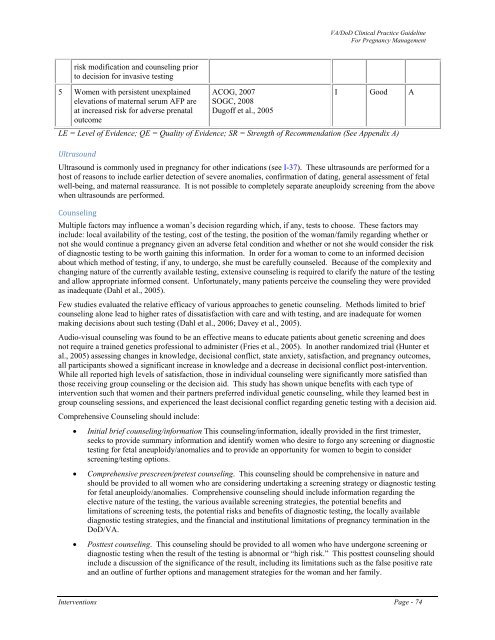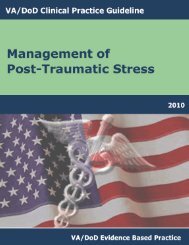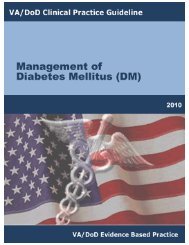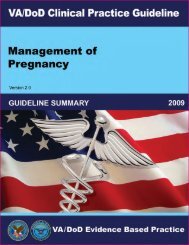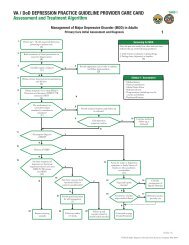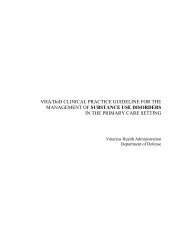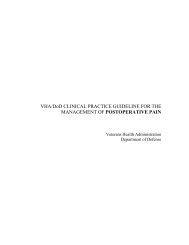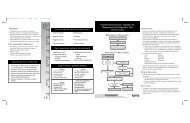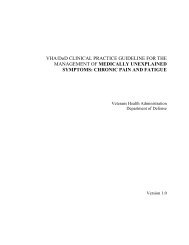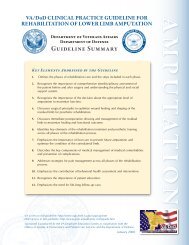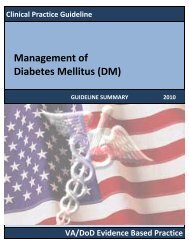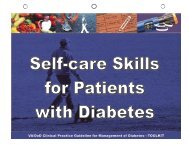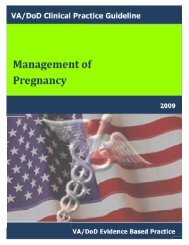Management of pregnancy - VA/DoD Clinical Practice Guidelines ...
Management of pregnancy - VA/DoD Clinical Practice Guidelines ...
Management of pregnancy - VA/DoD Clinical Practice Guidelines ...
You also want an ePaper? Increase the reach of your titles
YUMPU automatically turns print PDFs into web optimized ePapers that Google loves.
<strong>VA</strong>/<strong>DoD</strong> <strong>Clinical</strong> <strong>Practice</strong> Guideline<br />
For Pregnancy <strong>Management</strong><br />
risk modification and counseling prior<br />
to decision for invasive testing<br />
5 Women with persistent unexplained<br />
elevations <strong>of</strong> maternal serum AFP are<br />
at increased risk for adverse prenatal<br />
outcome<br />
ACOG, 2007<br />
SOGC, 2008<br />
Dug<strong>of</strong>f et al., 2005<br />
I Good A<br />
LE = Level <strong>of</strong> Evidence; QE = Quality <strong>of</strong> Evidence; SR = Strength <strong>of</strong> Recommendation (See Appendix A)<br />
Ultrasound<br />
Ultrasound is commonly used in <strong>pregnancy</strong> for other indications (see I-37). These ultrasounds are performed for a<br />
host <strong>of</strong> reasons to include earlier detection <strong>of</strong> severe anomalies, confirmation <strong>of</strong> dating, general assessment <strong>of</strong> fetal<br />
well-being, and maternal reassurance. It is not possible to completely separate aneuploidy screening from the above<br />
when ultrasounds are performed.<br />
Counseling<br />
Multiple factors may influence a woman’s decision regarding which, if any, tests to choose. These factors may<br />
include: local availability <strong>of</strong> the testing, cost <strong>of</strong> the testing, the position <strong>of</strong> the woman/family regarding whether or<br />
not she would continue a <strong>pregnancy</strong> given an adverse fetal condition and whether or not she would consider the risk<br />
<strong>of</strong> diagnostic testing to be worth gaining this information. In order for a woman to come to an informed decision<br />
about which method <strong>of</strong> testing, if any, to undergo, she must be carefully counseled. Because <strong>of</strong> the complexity and<br />
changing nature <strong>of</strong> the currently available testing, extensive counseling is required to clarify the nature <strong>of</strong> the testing<br />
and allow appropriate informed consent. Unfortunately, many patients perceive the counseling they were provided<br />
as inadequate (Dahl et al., 2005).<br />
Few studies evaluated the relative efficacy <strong>of</strong> various approaches to genetic counseling. Methods limited to brief<br />
counseling alone lead to higher rates <strong>of</strong> dissatisfaction with care and with testing, and are inadequate for women<br />
making decisions about such testing (Dahl et al., 2006; Davey et al., 2005).<br />
Audio-visual counseling was found to be an effective means to educate patients about genetic screening and does<br />
not require a trained genetics pr<strong>of</strong>essional to administer (Fries et al., 2005). In another randomized trial (Hunter et<br />
al., 2005) assessing changes in knowledge, decisional conflict, state anxiety, satisfaction, and <strong>pregnancy</strong> outcomes,<br />
all participants showed a significant increase in knowledge and a decrease in decisional conflict post-intervention.<br />
While all reported high levels <strong>of</strong> satisfaction, those in individual counseling were significantly more satisfied than<br />
those receiving group counseling or the decision aid. This study has shown unique benefits with each type <strong>of</strong><br />
intervention such that women and their partners preferred individual genetic counseling, while they learned best in<br />
group counseling sessions, and experienced the least decisional conflict regarding genetic testing with a decision aid.<br />
Comprehensive Counseling should include:<br />
• Initial brief counseling/information This counseling/information, ideally provided in the first trimester,<br />
seeks to provide summary information and identify women who desire to forgo any screening or diagnostic<br />
testing for fetal aneuploidy/anomalies and to provide an opportunity for women to begin to consider<br />
screening/testing options.<br />
• Comprehensive prescreen/pretest counseling. This counseling should be comprehensive in nature and<br />
should be provided to all women who are considering undertaking a screening strategy or diagnostic testing<br />
for fetal aneuploidy/anomalies. Comprehensive counseling should include information regarding the<br />
elective nature <strong>of</strong> the testing, the various available screening strategies, the potential benefits and<br />
limitations <strong>of</strong> screening tests, the potential risks and benefits <strong>of</strong> diagnostic testing, the locally available<br />
diagnostic testing strategies, and the financial and institutional limitations <strong>of</strong> <strong>pregnancy</strong> termination in the<br />
<strong>DoD</strong>/<strong>VA</strong>.<br />
• Posttest counseling. This counseling should be provided to all women who have undergone screening or<br />
diagnostic testing when the result <strong>of</strong> the testing is abnormal or “high risk.” This posttest counseling should<br />
include a discussion <strong>of</strong> the significance <strong>of</strong> the result, including its limitations such as the false positive rate<br />
and an outline <strong>of</strong> further options and management strategies for the woman and her family.<br />
Interventions Page - 74


